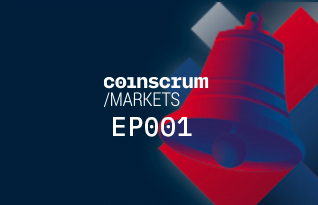Garrick Hileman, head of research at Blockchain.com, and Daniel Masters, executive chairman at CoinShares, discussed an extensive report that Blockchain.com published on gold. CoinShares and Blockchain.com are part of a consortium behind the DGLD token, which is a gold-backed token on a Bitcoin sidechain. Masters discussed the investment case for gold as it relates to the cryptocurrency investor, saying:
“Let’s be honest, there are many very effective ways of trading gold, through ETFs, through physical gold, through gold futures, through gold swaps, even apps like Robinhood and Revolut now have sort of a gold-tracking kind of instrument you can very easily buy. But I think the gold, the idea for a crypto investor in a general sense is, here I am, I’m trying to get out of the volatility of crypto and into something more stable. So the question then becomes, ‘what and how do you do that?’… (11:06) What’s cool about gold in general and cool about gold tokens in particular is that gold is such a unique commodity and because of its long, long history and because of the way it’s become an international clearing asset for central banks when they borrow and lend to each other, gold exists entirely outside of the banking system and banking regulation and financial services regulation in general. So long as the gold you’re talking about is of a certain kind and allocated in a certain way, that gold escapes all central bank, governmental and regulatory policy. And therefore it really is the most secure and stable form of value that’s currently available in the environment we’re looking at.”
Masters also addressed central bank digital currencies and the dynamic between them, gold and bitcoin, saying:
“Central bank digital currencies bring in real-time accounting, a lack of…black market, there’s surveillance good or bad around currencies, it’s very, very powerful. And I think the fact the Chinese are now road testing a digital currency is really going to advance that argument. And so that spectrum, on the one hand China is going to eat your lunch and use a digital currency for international finance and on the other hand how am I going to close negative interest rates, which are a real possibility, that speaks volumes to digital currencies. But those digital currencies may well come with a haircut. And that’s where a gold token actually has a tremendous potential as a currency. And it’s almost like a whole parallel new universe that’s created. Beforehand we had fiat money and banks and gold. And now you may have bitcoin and central bank digital currencies, and they’ll form the same kind of pairing: fiat and gold, bitcoin and CBDC. And in a world where there’s lots of CBDCs, bitcoin doesn’t look so strange…So this is all connected. Negative rates, the retail adoption of coins and wallets, the central bank digital currencies, this is all going to come into play I think in the next 12 months.”
Bitcoin’s volatility isn’t going to go away, but the market has changed since the 2017 bull run. And many people who invest in bitcoin are trading it. To those people, Masters says,
“To me, you’re trading gold and bitcoin. You’re trading the same idea in different forms. One’s highly volatile and quite risky, ones less volatile and less risky. And it also happens to be a place to park your bitcoin when you’re not in bitcoin. So those two come into a bucket. My personal feeling at the moment is that, it’s sort of a technical issue, what we’re seeing in bitcoin at the moment is that the big spikes are getting quickly sold. And I think part of the reason for that is there is still so much leverage available. When people see a little pop, everybody jumps in 20x and tries to make a quick $2,000 in BTC. that’s where you see these little spikes up followed by big spikes down But I think what’s actually going to happen in bitcoin, it’s going to go in a shallow uptrend. And so I do feel like the outsized reurtrns of 20-30% in a day that you’ve senin bitcoin in the past while profitable and risky and alluring to investors, i think there’s going to be much less of that going forward and a much more steady flow punctuated by some of these leverage-based pops.”
